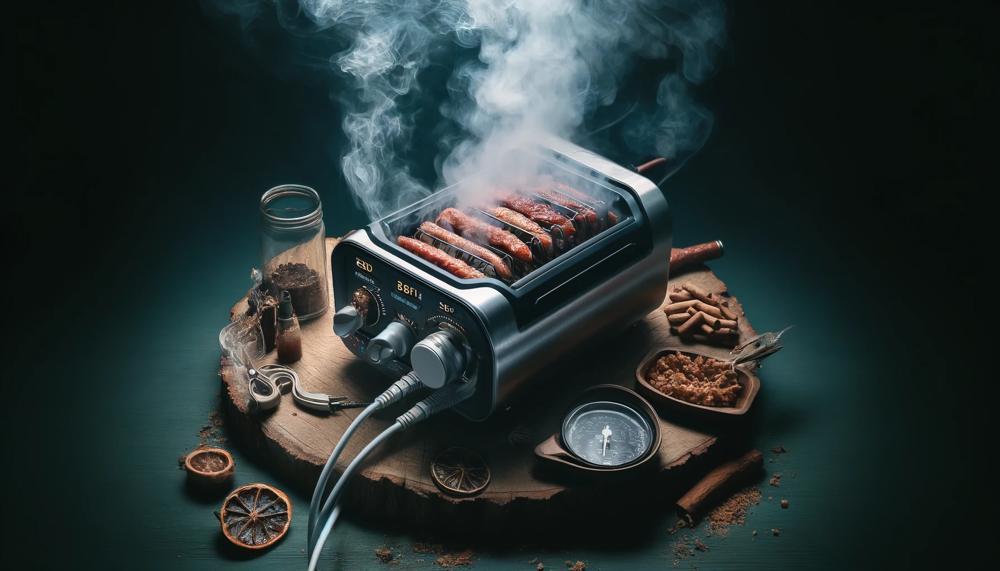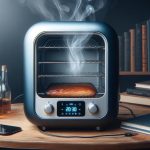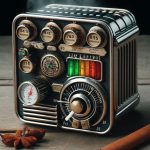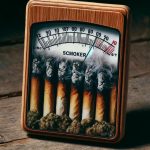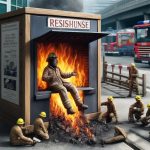As a BBQ enthusiast, you may have noticed that your electric smoker produces significantly less smoke than traditional charcoal or wood smokers. We are here to unravel the reasons behind this phenomenon. So, why is my electric smoker not producing smoke?
There could be several reasons why your electric smoker is not producing much smoke:
- Inadequate Heat: The heating element is responsible for achieving the required cooking temperature inside the smoker and smoldering the wood chips to produce smoke.
- Burnt Up Wood Chips: If your wood chips are completely burnt up, they won’t produce any more smoke.
- Erroneous Temperature Settings: Incorrect temperature settings can affect the amount of smoke produced.
- Improper Wood Chips: The type and quality of wood chips you use can impact the amount of smoke produced1.
- Using Wet Wood Chips: Wet wood chips need to be dried out on the element before they smoke. It’s also worth noting that smaller wood chips often smoke easier.
- Chip Tray Not Resting Properly: If your chip tray is not resting properly on the burner element, it can affect the amount of smoke produced.
So, keep reading as we dive deeper into the science behind it. Get ready to expand your knowledge on all things electric smoking.
Contents
Masterbuilt Electric Smoker Components:
When it comes to producing mouth-watering smoked meals, the key components of a Masterbuilt electric smoker are crucial. These components, including the heating element, temperature control, wood chips, water pan, and airflow, all play a significant role in generating heat, regulating temperature, and producing that delicious smoky flavor. However, it is essential to regularly check and maintain these components to ensure optimal performance.
The heating element is responsible for generating heat inside the smoker. It is crucial to make sure that it is clean and free from any debris or buildup. Any blockages can affect the smoker’s ability to produce smoke and may even cause a fire hazard.
Temperature control is another critical component that affects smoke production. It regulates the temperature inside the smoker and ensures that it stays at the desired level throughout the smoking process. It is essential to regularly calibrate the temperature control to ensure accurate readings.
Wood chips are what give smoked food its signature flavor. It is essential to choose the right type of wood chips for the type of food you are smoking. Additionally, regularly adding fresh wood chips during the smoking process will ensure a consistent smoke production.
The water pan in a Masterbuilt electric smoker adds moisture to the food being smoked, preventing it from drying out. It is essential to keep an eye on the water levels and refill when necessary.
Airflow is crucial in maintaining the right balance of heat and smoke inside the smoker. It is essential to make sure that there are no obstructions blocking the flow of air.
To troubleshoot any issues with smoke production, first, make sure all components are clean and free from any blockages. Next, check for proper airflow by opening all vents and making sure they are not blocked. If needed, adjust the temperature control or add more wood chips to increase smoke production.
Common Issues with Masterbuilt Electric Smokers
Here are the top 10 common problems that can cause your Masterbuilt electric smoker to fail at producing smoke.
- Inadequate Heat – This can occur due to a variety of reasons, such as a defective heating element, loose wire connections, or internal component malfunctions.
- Poor Ventilation – Proper air circulation is crucial for a smoker to produce smoke. Obstructed vents or inadequate fan usage can result in insufficient ventilation, leading to a lack of smoke production.
- Clogged Burner – Regularly cleaning and maintaining your smoker is essential to prevent the buildup of debris that can clog the burner and restrict airflow. This can result in excessive smoke or even a burning smell.
- Low-Quality Wood Chips – The type and quality of wood chips used in your smoker play a significant role in producing smoke. Softwoods, such as pine or cedar, should be avoided as they do not produce enough smoke. Wet or damp wood chips should also be avoided as they will not produce enough heat to generate smoke.
- Overloading the Smoker – It may be tempting to fill up your smoker with as much food as possible, but this can lead to problems with airflow and uneven cooking temperatures. To avoid this issue, only fill the smoker up to two-thirds full and leave space for proper air circulation.
- Defective Electric Current Supply – A faulty fuse or connection can cause uneven cooking temperatures and even prevent smoke production altogether. Make sure to check and replace any faulty fuses and secure all connections for optimal performance.
- Incorrectly Adjusted Temperature Settings – Not following the manufacturer’s instructions or inaccurate temperature readings can result in incorrect temperature settings, limiting or stopping smoke production.
- Damaged Thermostat – If your smoker has a damaged thermostat, it can affect its ability to produce smoke. If you suspect this is the issue, consider replacing the thermostat for optimal performance.
- Moisture Inside the Smoker – Moisture inside the smoker can inhibit combustion, resulting in reduced smoke production. Ensure your smoker is in a dry location and use a waterproof cover if necessary.
- 10. Tight Seals – While tight seals are essential for maintaining proper temperature and smoke levels, if they are too tight, they can block airflow. If you notice your smoker is not producing enough smoke, check the seals and adjust them if needed.
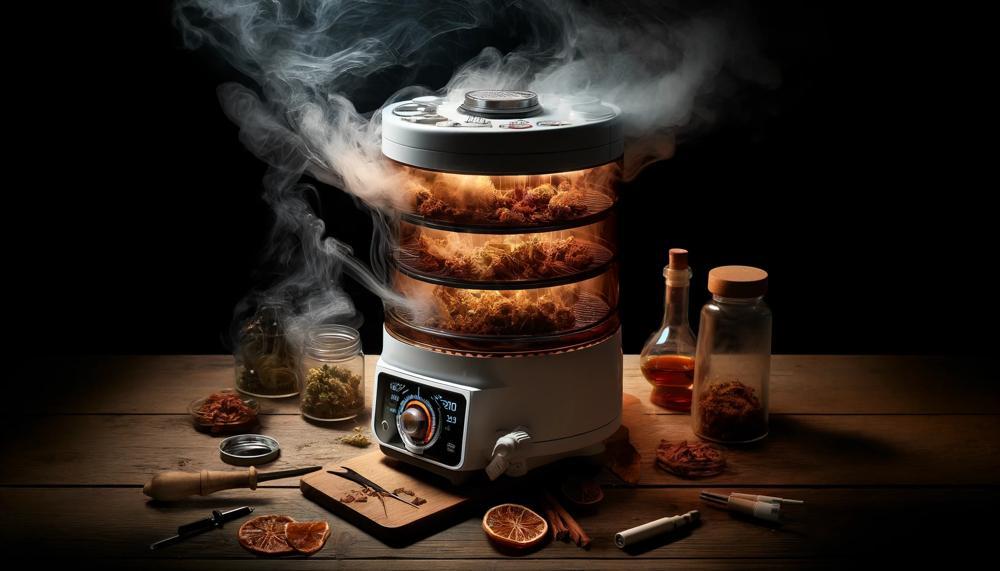
To avoid these common issues with your Masterbuilt electric smoker, make sure to follow the manufacturer’s instructions carefully, regularly clean and maintain your smoker, and use high-quality wood chips.
Troubleshooting Guide
An electric smoker is a convenient way to prepare delicious smoked foods. However, it can be frustrating when your smoker fails to produce smoke.
Before giving up on your smoked dishes altogether, try out these troubleshooting tips to get your electric smoker back in perfect working condition.
Possible Causes:
There are several reasons why your electric smoker may not be producing smoke:
- Insufficient heat due to a damaged heating element or incorrect temperature settings.
- Poor ventilation caused by clogged vents or air circulation.
- Low-quality wood chips that fail to produce sufficient smoke.
- A damaged electric current supply resulting from a faulty power cord or connections.
- A malfunctioning thermostat that fails to regulate temperature accurately.
- Moisture build-up inside the smoker.
- Tight seals around doors and lids that prevent proper airflow.
Troubleshooting Steps:
- Regularly check and maintain the heating element, vents, and air circulation of the smoker.
- Keep the burners clean and replace them when clogged.
- Use high-quality wood chips and avoid overloading the smoker with food.
- Check all fuses and connections in the power cord.
- Accurately adjust temperature settings.
- Regularly monitor the thermometer for accurate readings.
- Inspect and clean the smoker regularly to prevent moisture build-up.
- Ensure adequate airflow by regularly checking the fit of doors and lids.
By following these troubleshooting steps, you can effectively address common issues that may hinder your electric smoker’s ability to produce smoke.
Additional Tips and Tricks
Additional Tips and Tricks for Troubleshooting and Resolving the Issue of an Electric Smoker Not Producing Smoke:
- To troubleshoot a lack of smoke production, check the continuity of the heating element and replace it if necessary. This is a common cause that can be easily fixed by replacing the heating element.
- Ensure that all vents are open and unobstructed. Proper ventilation is crucial for producing smoke, so make sure all vents are clear of any debris or obstructions.
- Use a fan or blower to improve air circulation. If the smoker is not properly ventilated, using a fan or blower can help improve air flow and lead to better smoke production.
- Regularly clean and maintain the smoker. Build-up of grease and residue can affect the smoker’s performance, so it is important to regularly clean and maintain it.
- Use high-quality wood chips. Poor quality or chemically treated wood chips can affect the flavor and production of smoke. Stick to natural, untreated wood chips for best results.
- Do not overload the smoker. Overloading the smoker with too much food can result in poor smoke production. Follow manufacturer’s instructions for maximum capacity.
- Check power cord connections and fuses for damage or looseness. Loose or damaged power cords or fuses can prevent the smoker from functioning properly. Always check these components if there is a lack of smoke production.
- Adjust temperature settings according to manufacturer’s instructions and the type of food being smoked. Different types of food may require different temperature settings, so make sure to adjust accordingly for optimal smoke production.
- Replace a damaged thermostat if necessary. A faulty thermostat can lead to inaccurate temperature readings, affecting the smoker’s ability to produce smoke.
- Regularly inspect for leaks or moisture accumulation. Moisture inside the smoker can also affect smoke production, so frequently check for leaks or moisture build-up and address any issues.
- Properly maintain the seal around doors and lid. A tight seal is important for the smoker to function properly. Regularly check and maintain the seal around the doors and lid to ensure optimal smoke production.
- Allow enough space around the smoker for airflow. Placing the smoker in a cramped space can affect air circulation and smoke production. Make sure there is enough space around the smoker for proper airflow.
- Avoid using chemically treated wood chips. As mentioned before, poor quality or chemically treated wood chips can affect the flavor and production of smoke. Stick to natural, untreated wood chips for best results.
- Do not fill the smoker more than two-thirds full. Overfilling the smoker can lead to poor air circulation and smoke production. Follow manufacturer’s instructions for maximum capacity.
- Regularly check the thermometer for accurate temperature readings. A faulty or inaccurate thermometer can affect the smoker’s ability to produce smoke. Make sure to regularly check and calibrate the thermometer as needed.
- Optional: Adding water to the smoker can add moisture and flavor when smoking, but it is not necessary.
Conclusion
In conclusion, electric smokers may not make as much smoke as charcoal or wood smokers, but they are easier to use and make the kitchen healthier. If you know how to take care of the important parts of a Masterbuilt electric smoker, you can make sure that it produces the best smoke for tasty smoked foods. Do not forget that electric smokers still need proper care and attention to work well, even though they use electricity to make heat instead of burning wood.
If you’re having trouble with your electric smoker making smoke, here are some things you can try to fix the problem. Starting with good wood chips made especially for electric grills is the first step. Because these chips are smaller and burn more efficiently, they produce more smoke. Also, don’t put too many wood chips in your smoker at once; this can make them smolder instead of making smoke.
Be sure to remember these tips and tricks as you start to learn how to smoke an electric cigarette. Don’t let the lack of traditional thick smoke put you off; instead, look at the pros of an electric smoker and enjoy perfectly cooked meats every time.

